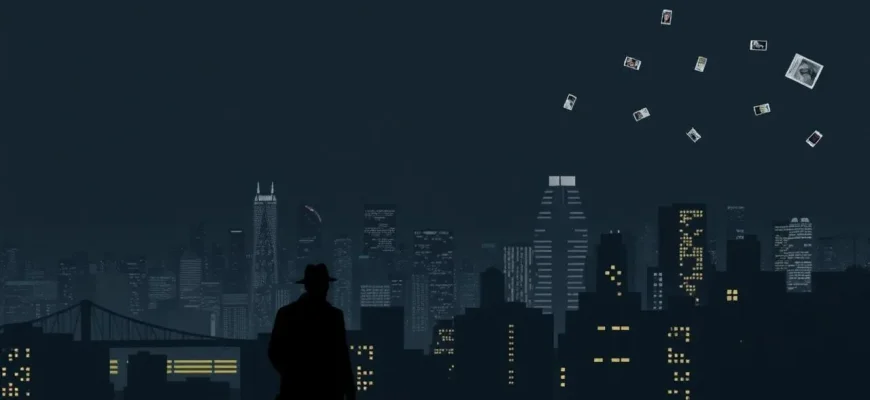- The Thin Blue Line (1988)
- Paradise Lost: The Child Murders at Robin Hood Hills (1996)
- Dear Zachary: A Letter to a Son About His Father (2008)
- The Imposter (2012)
- The Jinx: The Life and Deaths of Robert Durst (2015)
- Capturing the Friedmans (2003)
- The Staircase (2004)
- The Central Park Five (2012)
- Making a Murderer (2015)
- Amanda Knox (2016)
Are you fascinated by the darker side of human nature? This curated collection of crime documentaries delves into some of the most perplexing, chilling, and thought-provoking cases from around the world. From unsolved mysteries to in-depth explorations of criminal minds, these films offer not just entertainment but also a deeper understanding of crime, justice, and the human psyche. Whether you're a true crime aficionado or simply curious about the complexities of law enforcement, this selection promises to captivate and enlighten.

The Thin Blue Line (1988)
Description: Errol Morris's classic documentary investigates the case of Randall Dale Adams, who was wrongfully convicted of murdering a police officer. It's a pioneering work in the true crime genre.
Fact: The film's impact led to Adams' conviction being overturned, showcasing the power of documentary filmmaking.
 Watch Now
Watch Now 
Paradise Lost: The Child Murders at Robin Hood Hills (1996)
Description: This documentary series follows the case of the West Memphis Three, three teenagers accused of the ritualistic murder of three children.
Fact: The series played a significant role in raising awareness about the case, leading to the eventual release of the accused.
 Watch Now
Watch Now 
Dear Zachary: A Letter to a Son About His Father (2008)
Description: Initially intended as a tribute to a murdered friend, this documentary evolves into a gripping investigation into the legal system and a mother's love.
Fact: The film was instrumental in changing Canadian law regarding bail for murder suspects.
 Watch Now
Watch Now 
The Imposter (2012)
Description: A bizarre tale of a French con artist who impersonates a missing Texas boy, this documentary blurs the lines between truth and deception.
Fact: The film was nominated for a BAFTA for Best Documentary.
 Watch Now
Watch Now 
The Jinx: The Life and Deaths of Robert Durst (2015)
Description: A chilling look at the life of real estate heir Robert Durst, suspected of multiple murders. The series includes interviews with Durst himself, culminating in a shocking confession.
Fact: The final episode features Durst seemingly confessing to the crimes while unaware that his microphone was still on.
 Watch Now
Watch Now 
Capturing the Friedmans (2003)
Description: This film delves into the life of the Friedman family, whose patriarch and son were accused of child molestation. It explores the nature of truth, memory, and family dynamics.
Fact: The documentary uses home videos and interviews to provide an intimate look into the family's life before and during the trial.
 30 Days Free
30 Days Free 
The Staircase (2004)
Description: This documentary series follows the trial of Michael Peterson, accused of murdering his wife Kathleen. It's a deep dive into the legal system, forensic science, and the ambiguity of truth.
Fact: The series has been updated multiple times with new episodes as the case evolved, making it a living document of a real-life legal drama.
 30 Days Free
30 Days Free 
The Central Park Five (2012)
Description: This film recounts the story of five black and Latino teenagers who were wrongfully convicted of assaulting and raping a woman in Central Park.
Fact: The documentary was directed by Ken Burns, Sarah Burns, and David McMahon, and it led to widespread recognition of the injustice done to the accused.
 30 Days Free
30 Days Free 
Making a Murderer (2015)
Description: This series examines the case of Steven Avery, who was wrongfully convicted of assault and later charged with murder. It raises questions about the justice system and the presumption of innocence.
Fact: The documentary led to widespread public debate and even influenced legal proceedings related to the case.
 30 Days Free
30 Days Free 
Amanda Knox (2016)
Description: This documentary provides a comprehensive look at the case of Amanda Knox, who was convicted and later acquitted of murdering her roommate in Italy.
Fact: Amanda Knox herself participated in the documentary, providing her perspective on the events.
 30 Days Free
30 Days Free 








